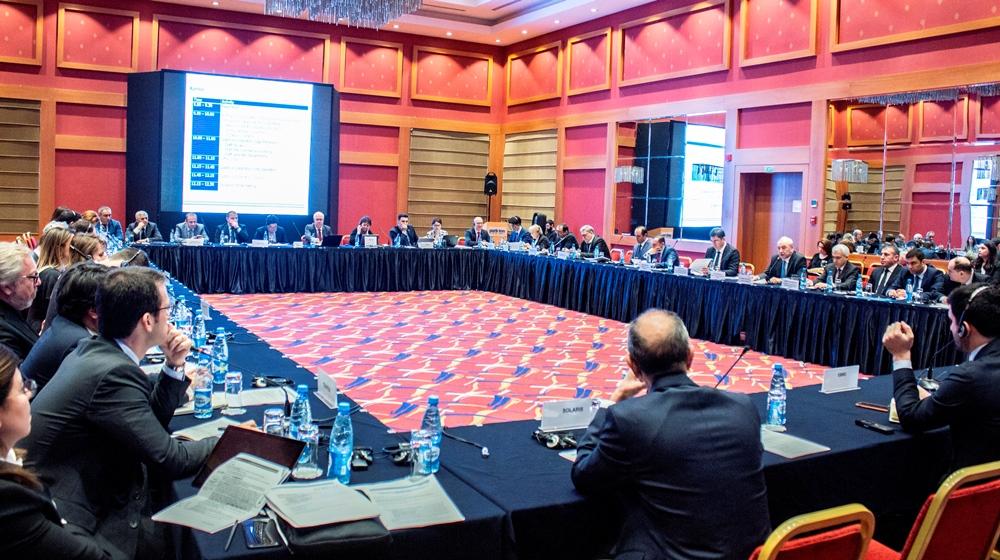Legal framework in renewable energy under development

By Leman Mammadova
Development of renewable energy sphere demands successful collaboration of public and private entities.
The next round table on cooperation between the public and private sector in the development of renewable energy legislation was held with the participation of representatives of the Ministry of Energy, relevant government agencies, international organizations and financial institutions.
Deputy Minister of Energy Samir Valiyev said that currently significant steps are being taken to improve the legal framework in renewable energy, development of energy purchase and sale contracts, auction mechanisms, and the measures are taken, taking into account proposals for the interests of investors, risk assessment.
Chief Consultant of DNV-GL Ilka Lewington gave information about the work done on preparation of relevant normative legal acts in the field of renewable energy. She considered it important the application of a guaranteed tariff system, tax and customs privileges, and the support for renewable energy projects.
At the event, experts made proposals on auction of selected areas for renewable energy sources, the study of the application of mixed auction model, simplified licensing and authorization mechanism, use of additional financial resources, and retail tariff rates.
Then a presentation on "Renewable energy auctions" was held. It was noted that, firstly, the area of 1000 MW capacity was determined to build 600 MW of wind and 400 MW solar power stations in these areas. So far, about 20 areas with renewable energy potential have been identified and technical analyzes have been carried out. Information on the possibilities of connecting networks to the stations and the environmental impact assessment in those areas were also mentioned.
The new draft law on alternative energy sources in Azerbaijan will be ready by May 2019.
The Norwegian DNV GL helps create a support system and a legal framework in Azerbaijan's alternative energy sector. Recently, the company won the tender of the Ministry of Energy and was selected as a consulting company to develop a bill and other legislation.
Earlier, I.Lewington stated that wind and solar power potential in Azerbaijan is sufficient and selection of the potential territories and their connection to the grids are the key issues. The areas that have favorable relief for wind and solar stations have already been identified, that is, Nakhchivan (solar energy), the Western region of Khizi and the Absheron Peninsula (wind energy).
Azerbaijani legal framework must meet interests and expectations of investors. In terms of this, it is important to hold talks with potential investors and familiarize them with the existing potential of Azerbaijan in this area. The interests of investors may be considered in the drafts being prepared and thus, in the coming years, Azerbaijan will implement significant projects in the field of renewable energy sources based on private investments.
Memorandums of cooperation have already been signed with the UAE-based company Masdar, with Turkish company Tekfen and UK's Atkins.
The Energy Ministry has already signed memorandums of understanding with BP, TOTAL and Equinor on alternative energy cooperation.
The favorable geographic location and climatic conditions allow the widespread use of environmentally friendly alternative energy sources in Azerbaijan.
The capacity of the energy system of Azerbaijan is more than 6,000 megawatts. At the same time, according to experts, the potential of renewable energy sources in the country is more than 25,300 megawatts.
At present, 18 percent of electricity production in Azerbaijan fell on alternative energy sources, in which hydroelectric power stations hold main share, although most of the country's potential in this area falls on solar energy (estimated at 5,000 megawatts).
Some 4,500 megawatts accounts for wind power, 1,500 megawatts -- for biomass, 800 megawatts -- for geothermal energy, and the remaining 350 megawatts -- for the small hydro power plants (HPP).
As much as 23.2 billion kWh of electricity was produced in Azerbaijan in 2018, thermal power plants produced electricity amounted to 20,534 kWh, hydro power to 1,737 kWh, solar energy to 38.3 kWh, wind power to 57,5 kWh.
There are plans to implement a number of projects totaling $2.3 billion in alternative energy.
The projects include a plant for production of biofuels (pellet fuels) in the Sabirabad district, construction of wind power plants in the Pirallahi district, an agro-energy residential complex in the Samukh district and others.
Construction of two wind power farms worth $800 million and $408.9 million in the Pirallahi district, as well as a wind power farm worth $377.7 million in the Khizi district are the biggest projects planned for implementation.The Azerbaijani government is planning to increase the share of alternative energy by 30 percent by 2030 in total power generation.
---
Leman Mammadova is AzerNews’ staff journalist, follow her on Twitter: @leman_888
Follow us on Twitter @AzerNewsAz
Here we are to serve you with news right now. It does not cost much, but worth your attention.
Choose to support open, independent, quality journalism and subscribe on a monthly basis.
By subscribing to our online newspaper, you can have full digital access to all news, analysis, and much more.
You can also follow AzerNEWS on Twitter @AzerNewsAz or Facebook @AzerNewsNewspaper
Thank you!







